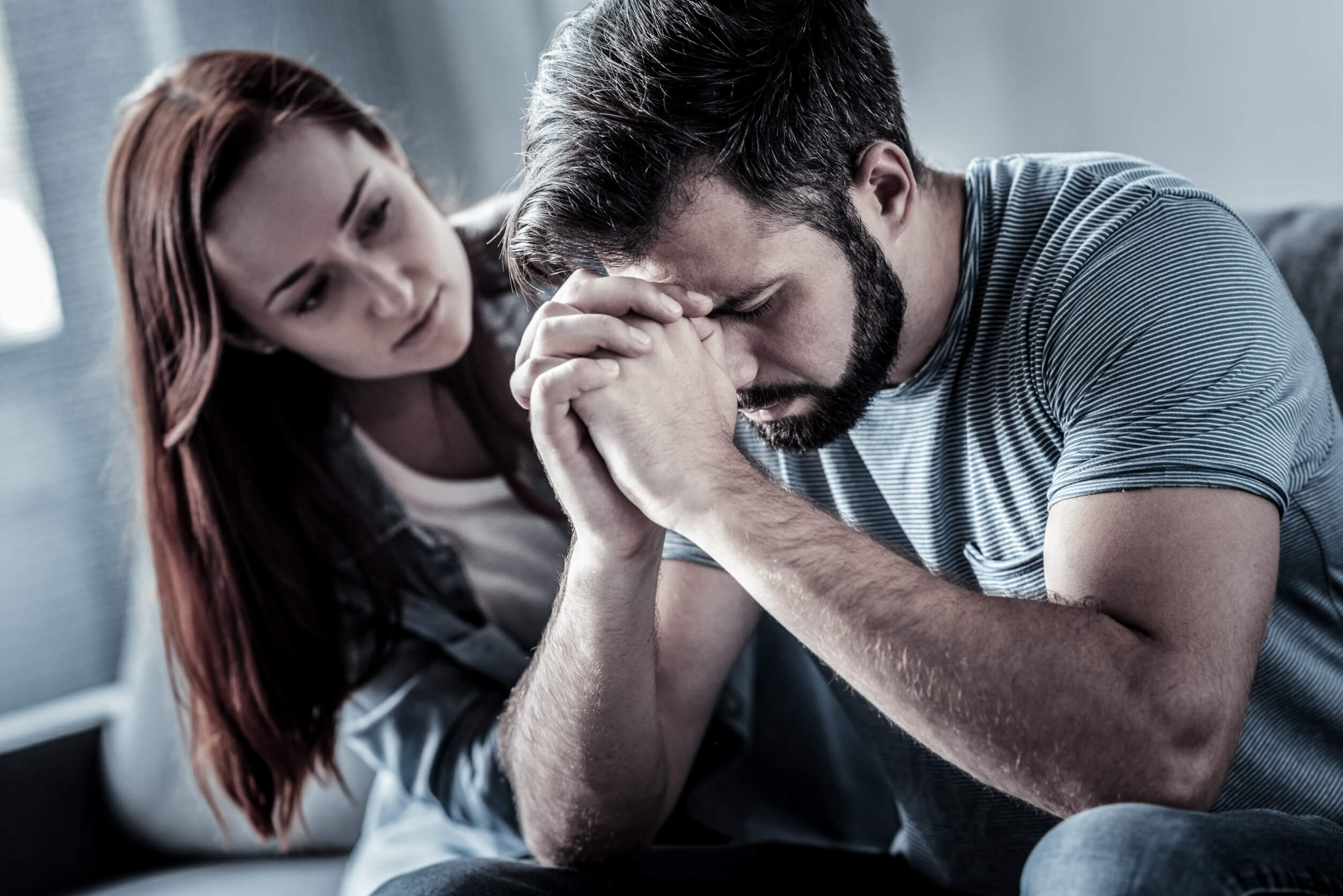Last updated: June 14th, 2025
The relationship between OCD and depression can be difficult to sort through. Understanding these two conditions and how they affect each other can help you get the help you need.
With contributions from Paul Greene, Ph.D.
Obsessive-Compulsive Disorder (OCD)
There are a lot of misconceptions about what OCD is. OCD is not simply a term for a preference that things be organized or clean. It is a potentially serious disorder that can become disabling for some people.
What does OCD look like? It varies widely from one type of OCD to another, but it always involves obsessions, compulsions, or (typically) both.
RELATED: 13 Types of OCD (Plus 5 Related Conditions)
What are obsessions?
Obsessions are feelings, thoughts, or images that are unwanted and intrusive and produce immediate anxiety or discomfort. They tend to repeat quite often despite efforts to “get rid of” them.
Common obsessions include:
- The thought or feeling that one is contaminated
- A thought or image of doing something violent or shocking, like attacking a stranger
- Doubts about having left a door unlocked or a stove burner on
- Thoughts or images about sexual acts one does not want to commit
What are compulsions?
Compulsions are mental or observable physical actions. They are an effort to limit the anxiety or discomfort produced by an obsession.
Common compulsions include:
- checking locks, stoves, or appliances
- counting things
- cleaning things
- repeating movements or phrases
- hand washing
- reassurance seeking
(See our OCD overview page for more information.)
Major Depressive Disorder
Major depressive disorder is a type of depression that significantly impacts one’s life for at least two weeks. Episodes of major depressive disorder can last for years. Symptoms can include:
- low self-worth
- pervasive sadness
- reduced interest in enjoyable activities
- difficulty concentrating
- changes in appetite or weight
- reduced energy levels
- thoughts of death or suicide
- excessive inappropriate guilt
- changes in sleep quality and amount
(See our depression overview page for more information.)
How Common Is Depression in People with OCD?
Studies typically show that approximately 33% to nearly 40% of people with OCD also have significant depression; it’s not at all uncommon. People with OCD are about 10 times more likely to experience depression compared to people who don’t. If you’re experiencing symptoms of both conditions, you’re not alone.
Can OCD Cause Depression?
Yes. Most people who have both OCD and depression usually experience OCD symptoms first (rather than depression first, or both conditions beginning at the same time). This suggests that, for most people, depression can develop because of the impact of OCD on their lives. If someone’s OCD symptoms get in the way of their ability to socialize with their loved ones, do work, or even feel relaxed at home, they might start feeling depressed.
Also, some obsessions and compulsions can be pretty scary and isolating. If you have harm OCD, for example, you might be plagued by upsetting thoughts such as, “What if I stab my family member against my will?” Or you might feel like something is deeply wrong with you, and the intense guilt or shame can contribute to your depression. You might fear you’re out of control, or even avoid your family for fear of causing them harm, which can cause a lot of distress. As another example, if you have checking compulsions that take up many hours of your day, it can disrupt your time with friends or ability to do activities that you enjoy. Without these pleasurable activities and relationships, your chances of developing depression are higher.

The Challenges of Having Both OCD and Depression
Either of these two conditions can significantly impact your life. Having both presents difficulties that either condition alone would not.
For example, people with OCD often see significant improvement from doing a form of cognitive-behavioral therapy called exposure and response prevention (ERP/ExRP). This therapy is quite effective, but it requires work from the patient. If the patient is depressed, they might be fatigued. Alternatively, their hopelessness might make them think that there’s no point in trying. These depressive symptoms can make it difficult for them to complete all the exercises recommended by the ERP/ExRP therapist. This will significantly slow any improvement.
Another example would be someone in therapy for depression who is looking to become more active and engaged. Making changes like these is often helpful for those with depression. Unfortunately, compulsions can make it difficult or impossible to engage in new and enjoyable activities. How does this work? It can be difficult to leave the house if you need to check the stove dozens of times before you go. Meeting new people is daunting if you’re depressed, and it’s even harder if you have obsessive thoughts that can interfere, e.g., getting herpes from shaking hands with a new acquaintance.
Treatment for OCD and Depression
Fortunately, there are effective treatments for the combination of depression and OCD.
Therapy for depression
Various forms of psychotherapy have been proven to be effective in treating depression. The American Psychological Association recommends the following therapies:
- Behavioral therapy
- Cognitive therapy
- Cognitive-behavioral therapy (CBT)
- Mindfulness-based cognitive therapy (MBCT)
- Interpersonal psychotherapy (IPT)
- Psychodynamic therapies
- Supportive therapies
Therapy for OCD
In contrast to therapies for depression, the psychotherapies recommended for OCD are much more limited. Exposure and response prevention (ERP), mentioned above, is the therapy of choice for OCD. Since ERP does not help with depression, and the therapies that help for depression typically do not help for OCD, people with these two conditions should seek out a therapist who can treat both.
As the list above shows, CBT is one of the therapies that can address depression. Studies have shown that for people with OCD and severe depression, therapy that focuses the first few sessions on strategies to combat depression can help boost motivation to participate fully in ERP for OCD. A therapist trained in both ERP and CBT can potentially tailor your OCD treatment based on your depression.
Medication for OCD and depression
The use of medication — also called pharmacotherapy — can also be effective for OCD and depression. Psychiatrists often prescribe selective serotonin reuptake inhibitors (SSRIs) to treat these problems, with some common ones described below. Other medications can be added if the first one prescribed is insufficient.
Prozac (Fluoxetine)
Studies have shown that Prozac can be helpful in reducing depression, obsessive thoughts and certain compulsions (e.g., washing compulsions), while also improving people’s overall quality of life. Typical doses for OCD are around 40-80 mg per day.
Luvox (Fluvoxamine)
Luvox is helpful for both obsessive and depressive symptoms. It can also reduce anxiety and avoidance related to OCD. People with OCD often take up to 300 mg per day.
Lexapro (Escitalopram)
In research trials, Lexapro helped improve OCD symptoms and helped people maintain their treatment progress. It can also help with depressive symptoms. Compared to other SSRIs, it targets more specific serotonin receptors, so it may have fewer interactions with other medications. Usually, dosages for OCD are about 20-40 mg per day.
Zoloft (Sertraline)
Zoloft is effective in reducing depressive symptoms and obsessive-compulsive symptoms, as well as anxiety and avoidance related to OCD. Typical dosages are about up to 200 mg per day for OCD.
If you want medications to work for you, you’ll need to take them regularly according to your prescriber’s instructions. Approximately 50% of people with OCD discontinue their medications, often because of side effects or interactions with other medications. You should discuss any side effects with your prescriber, who can try to help you manage them by changing the dosage or switching medications.
Is It Common for People with OCD to Also Have Anxiety?
Yes. About 5-35% of people with OCD also have an anxiety disorder, whether it’s generalized anxiety, social anxiety, panic disorder or specific phobia. People with OCD are around ten times more likely to have panic disorder, agoraphobia, or generalized anxiety disorder than people without OCD. The good news is that therapies involving ERP are effective in treating both OCD and anxiety disorders, so an ERP therapist can probably help you learn some strategies that you can apply to both your OCD and your anxiety symptoms.
Frequently Asked Questions
How can you help someone with OCD and depression?
If you have a loved one experiencing OCD and depression, it’s worth gently encouraging them to look for professional help. They might or might not be open to therapy or medication, but your perspective could make a difference.
Aside from that, here are practical things you can do that can be helpful:
- Be open to talking about it. This can help you understand what your loved one is going through. However, avoid jumping into “problem solving” mode or getting wrapped up discussing the “logic” behind their OCD. Just be there for them.
- Avoid enabling their OCD or depressive behaviors. It’s understandable that you want to lessen their distress. You might think that the only way to do that is to comply with their requests related to their OCD or depression (e.g. repeatedly washing dishes, providing excessive reassurance). However, enabling these behaviors can inadvertently keep the same cycles of OCD and depression going. If you’ve been involved in their OCD behaviors for a long time, gradually decreasing your participation in their compulsions might take some collaborative planning or professional advice.
- Try to practice patience and a non-judgmental attitude. This can help decrease shame and stigma around having these conditions. Also, your loved one’s symptoms may improve at times and worsen at others. You may need to adjust your expectations. You can continue encouraging them to go outside their comfort zone when they can, but try not to put too much pressure on them.
- Recognize any improvements, even if they’re just small changes. Resisting their OCD- and depression-related urges takes hard work! So remind your loved one to reward themselves for their progress.
Are you born with OCD or does it come from trauma?
Experts believe that OCD is caused by a combination of biological and environmental factors. If you have a family history of OCD, you are probably more likely to develop the condition since there is a genetic component to OCD. However, there isn’t a single gene that will cause you to be born with OCD, and simply having a family member with OCD does not guarantee that you will also have OCD.
Similarly, trauma or stressful life events can sometimes trigger the beginning or worsening of OCD symptoms in people with a predisposition for OCD. That said, not everyone with OCD has a trauma history, and trauma is rarely the sole cause of the disorder.
Is OCD considered a disability?
OCD can be considered a disability. It is listed in the Social Security Administration’s list of disabilities that qualify for Social Security benefits. Also, OCD qualifies as a disability under the Americans with Disabilities Act (ADA) if it substantially limits one or more of your major life activities.
Not everyone with OCD is disabled, of course. It depends on the severity and impact on your life, including your job, day-to-day activities, and overall well-being. However, the ADA and the Individuals with Disabilities Education Act (IDEA) offers protections and reasonable accommodations for those with OCD in educational, employment, and public settings.
That said, there sometimes downsides to labeling OCD as a disability. For example, some accommodations might worsen OCD symptoms. Also, it might make your OCD seem untreatable – even when there are treatments that typically work. Nevertheless, if you’re interested in going on disability for your OCD, you may need to seek professional help and documentation to prove how your symptoms affect your ability to work and perform essential tasks.
Is OCD a mental illness?
Yes, OCD is a mental illness. It’s recognized as a mental health condition that’s distinct from anxiety and depressive disorders. It can be treated by qualified mental health professionals.
Can people recover from OCD?
Absolutely. The majority of people with OCD show significant improvements from treatment. Over 50% of people with OCD will no longer meet the diagnosis for OCD after ERP therapy and have a better quality of life. Many will no longer have OCD symptoms at all. Of course, after treatment is over, it is still possible to experience a recurrence of symptoms. This is why an essential part of ERP is relapse prevention. Even if you do experience OCD symptoms again, you haven’t necessarily lost all your progress. If you re-enter therapy, the process will likely go more quickly because you can remember what worked for you before.
Why is it so hard to overcome OCD?
There are so many factors that make it hard to overcome OCD. For one, OCD can be a vicious cycle. Say you have an obsessive thought that makes you really anxious, and makes you want to engage in a compulsion. Every time you engage in compulsions, or avoid certain situations or triggers, you get temporary relief. That’s why those choices are so appealing. After all, who wouldn’t want their anxiety to go away? But in the long term, engaging in these behaviors makes it more likely for your obsessive thoughts (and subsequently, your compulsions) to keep coming back. It doesn’t give you the chance to learn that you can push through the anxiety and uncertainty and choose how to act based on your goals and values, rather than based on your fear.
Other reasons OCD is difficult to overcome include high rates of co-occurring conditions, like depression and anxiety. Also, OCD can be partly fueled by deeply rooted beliefs and emotions like guilt, shame, and fear of harm. It is often challenging to face and work through these emotions, although doing so can have a big long-term impact.
The combination of OCD and depression can be difficult to deal with. If you’re considering starting therapy for OCD, depression, or both, please contact us to discuss today.









